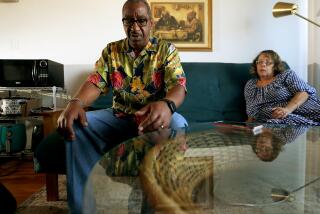Bernardi Asks Review on Placement of Parolees
- Share via
A Los Angeles city councilman Wednesday called for city officials to determine if state policy that allowed a paroled killer to be placed in a North Hollywood apartment adequately safeguards the community.
Councilman Ernani Bernardi asked the city’s chief legislative analyst to enlist the aid of the city attorney’s office and the Police Department in conducting “an immediate review of the laws, policies and procedures that allowed the parole of Raymond Louis George to the community of North Hollywood.”
The City Council routinely referred his motion to its Police, Fire and Public Safety Committee for a recommendation.
On Jan. 18, George, convicted in 1985 of carrying a concealed weapon and sentenced to four years, was paroled from the California Men’s Colony at San Luis Obispo and placed in an apartment in the 11800 block of Vanowen Street. George--previously convicted of killing a police officer, shooting another officer and attacking a college student with a machete in 1974--is on medication for a psychiatric condition.
Removed From Apartment
George, 36, was removed from the apartment Tuesday when neighbors became alarmed after seeing news reports on his release and receiving copies of an internal police memo mailed anonymously to them without departmental authorization. The memo described George as a mentally ill man who “believes his mission in life is to kill police officers and women.”
Authorities have refused to disclose George’s new location except to say that it is not in the San Fernando Valley.
“Clearly, it is in the public interest to provide those who have paid their debt to society with the opportunity to rejoin the community without interference,” Bernardi said. “However, it appears to be a threat to public safety for the state Department of Corrections to place individuals it describes as ‘dangerous’ and in a ‘delicate’ psychiatric condition in a residential community with no word of warning to that community.”
However, corrections officials said George’s parole and placement were handled in compliance with state regulations. They said they had no choice but to release him because state law entitles convicts not serving life sentences to be paroled under a formula that gives them credit for good behavior and work at prison jobs.
“We had no legal right to keep him one day longer,” said Jerry DiMaggio, regional administrator of the parole division.
State law also required that George be returned to the county where he was convicted, DiMaggio said. Once here, George was considered a “cold-turkey” case, parole parlance for having no family or residence to return to, DiMaggio said.
When George was previously paroled in 1983 after serving nine years in prison for the murder and assault convictions, his case was assigned to Hugh Alcott, now supervisor of the Van Nuys parole office. Because Alcott has had previous experience with George, he was assigned the ex-convict’s case when George was released last week. Alcott found the North Hollywood apartment for George, DiMaggio said.
DiMaggio said the manager of the apartment complex was aware that George was an ex-convict on parole when he accepted him as a tenant. The manager could not be reached for comment.
Rent for the apartment was paid with a check from the parole office, DiMaggio said. George’s rent will be paid from the office’s loan fund until he gets a job or qualifies for Social Security payments or other assistance because of his diminished mental capacity, he said.
Parole officials also informed the Police Department’s North Hollywood Division that George was living in the area. There was no other notification and none is required by law, DiMaggio said.
“It is becoming very difficult to parole people,” he added. “People don’t want them in their community. But when you are sending people to prison, you have to expect them to return.”
Bernardi, whose district includes the North Hollywood area where George was placed, agreed that state law requires no disclosure of such information other than to police. He asked that city staff report their findings on the procedures and make recommendations regarding any changes that should be sought.
More to Read
Sign up for Essential California
The most important California stories and recommendations in your inbox every morning.
You may occasionally receive promotional content from the Los Angeles Times.














